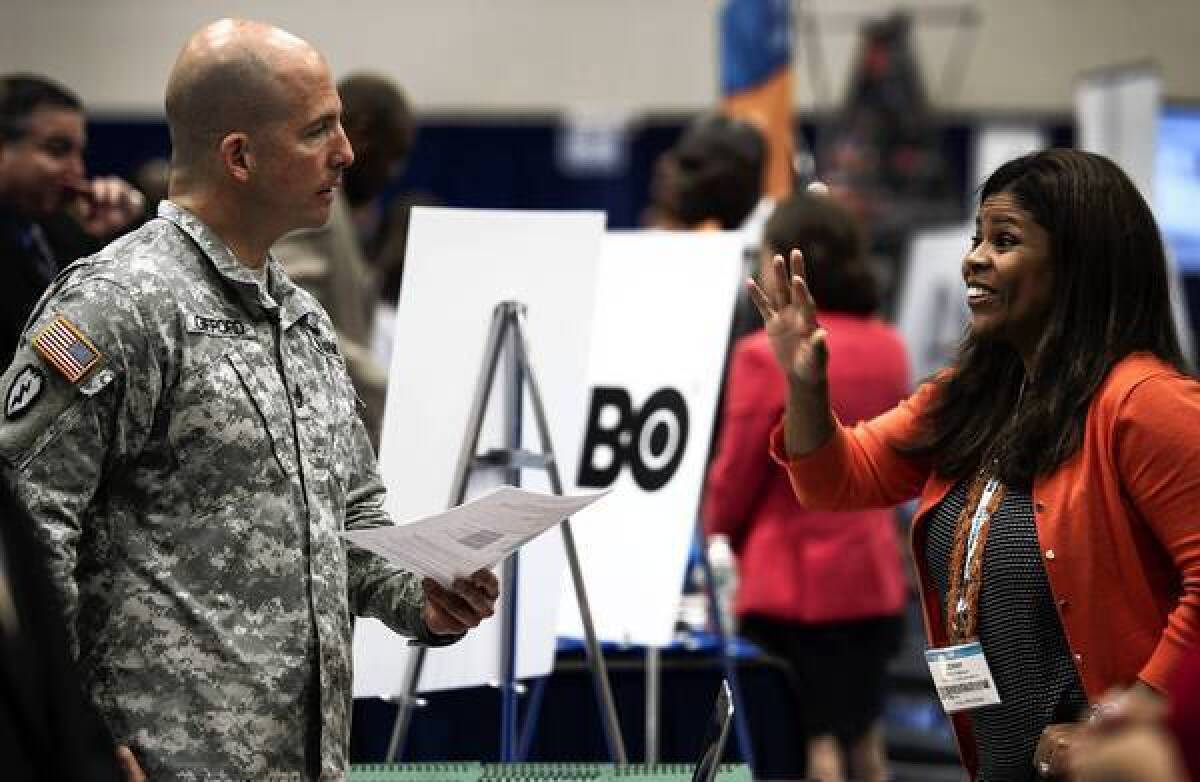Unemployment among recent veterans drops sharply

- Share via
Unemployment among recent veterans has fallen sharply and now is the same as for the rest of the U.S. population, hovering just above 7%, new federal statistics show.
The figures suggest that a vexing and stubborn trend of higher joblessness among veterans who left the military after September 2001 has been reversed. It now appears that veterans are being hired at a faster rate than non-veterans.
Advocates credited a variety of public and private efforts, including major U.S. corporations beginning to make good on pledges to hire hundreds of thousands of veterans, federal tax incentives for employers and allowances for veterans to receive professional licenses based on their military training.
In the second quarter of this year, average unemployment among post-9/11 veterans was 7.4%, according to the U.S. Bureau of Labor Statistics. That is not statistically different from the rate of 7.2% for non-veterans.
Until recently, the jobless rate among those veterans remained stuck in double digits, even as U.S. unemployment peaked in early 2010 and began to decline.
The labor bureau’s monthly employment surveys had been pointing toward a narrowing since April. But the monthly data are considered far less reliable than quarterly figures, which were released without fanfare earlier this month.
Government economists are cautiously optimistic about the decline. James Walker of the labor bureau called the improvement impressive but said there was no guarantee that the trend would continue.
About 2.8 million veterans have served in the military since the 2001 terrorist attacks. Their current employment picture looks even better when their demographics are taken into account. The largest share — more than 40% — are men between 25 and 34. Their unemployment rate was lower than that of their non-veteran counterparts: 6.6% compared to 7.3%.
Still, nobody is declaring victory.
“The labor force statistics are pointing in the right direction,” said Gary Shaheen, director of employment policy at Syracuse University’s Institute for Veterans and Military Families. “But we still have a lot of work to do.”
He and other advocates said they remain especially concerned about the high rate of unemployment among the very youngest veterans, as well as the range of challenges confronting women leaving the military.
More fundamentally, they said, simply matching the employment rates of non-veterans should not be the benchmark for success.
“The veterans have done something for their country,” said Derek Bennett, chief of staff for Iraq and Afghanistan Veterans of America. “The country has a moral obligation to ensure they are working and productive citizens.”
In 2011, the average unemployment rate was 12.1% for post-9/11 veterans and 8.7% for non-veterans.
Joblessness fell across the board in 2012, but a disparity in unemployment rates remained: 9.9% versus 7.9%. Those numbers held relatively steady until the second quarter of this year, when the gap disappeared.
Perhaps the most surprising statistic in the new quarterly data is the unemployment rate among female veterans of 7.1%, which is on par with male veterans and female non-veterans.
Until now, female veterans have consistently fared worse than those groups. Military sexual abuse, single parenthood and other challenges they face have spurred a variety of recent efforts to improve their employment prospects. They make up 19% of all post-9/11 veterans.
Experts cautioned that the job situation of female veterans has never been clear, owing to their relatively small numbers in the labor bureau’s monthly surveys. Of the 100,000 or so people surveyed each month, no more than a few hundred are female veterans. The statistics have large margins of error.
The data on the youngest veterans — those 18 to 24, who account for just over 7% of post-9/11 veterans — have similar limitations. Their unemployment rate was 18.5%, which economists said was not statistically different from the 15.2% rate among non-veterans in that age group.
Elevated rates of joblessness among recent veterans have been widely blamed on a failure of civilian employers to recognize the value of military training and experience. With fewer than 1% of Americans having served over the last decade, the military in some sense has been cut off from much of society.
The stigma surrounding post-traumatic stress disorder and other psychological wounds of war is also thought to have hurt hiring.
Paul Heaton, an economist at the Santa Monica-based think tank Rand Corp., said unemployment may be coming down because a bigger share of veterans have been out of the military long enough to find work.
The older rates were higher to some degree because they reflected a larger number of veterans who had just finished their service and were in transition, Heaton said. On average, people who are unemployed take more than eight months to find a job.
Heaton’s research suggests that when there were significant differences between recent veterans and the general population, the demographics of the veteran population — and not their veteran status — was the primary explanation. The disparities disappeared when he controlled for age, race, gender and education levels.
Heaton said he would advise policymakers to target employment programs to specific groups of veterans who may be at a disadvantage, such as those with physical or psychological disabilities.
The unemployment rate for veterans of all eras — 6.4% for the most recent quarter — has long been significantly lower than that of non-veterans.
“The research seems to suggest that over the long term, serving in the military is beneficial,” Heaton said. “People who have been in the military tend to be better employed and earn more.”







